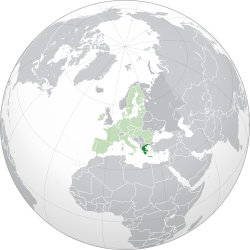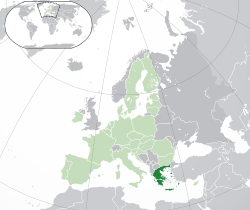Hellenic Republic | |
|---|---|
| Motto: Ελευθερία ή Θάνατος Elefthería í Thánatos (English: "Freedom or Death") | |
| Anthem: Ύμνος εις την Ελευθερίαν Ímnos is tin Eleftherían (English: "Hymn to Liberty") | |
Location of Greece (dark green) – in Europe (light green & dark grey) | |
| Capital and largest city | Athens 37°58′N 23°43′E / 37.967°N 23.717°E |
| Official language and national language | Greek |
| Religion (2017) |
|
| Demonym(s) |
|
| Government | Unitary parliamentary republic |
| Konstantinos Tasoulas | |
| Kyriakos Mitsotakis | |
| Nikitas Kaklamanis | |
| Legislature | Hellenic Parliament |
| Establishment history | |
Greek War of Independence against the Ottoman Empire | 25 March 1821 (traditional starting date) |
| 1 January 1822 | |
| 3 February 1830 | |
| 24 July 1974 | |
| 11 June 1975 | |
| Area | |
Total | 131,957 km2 (50,949 sq mi) (95th) |
Water (%) | 1.51 (2015) |
| Population | |
2024 estimate | |
2021 census | |
Density | 78.9/km2 (204.4/sq mi) (105th) |
| GDP (PPP) | 2024 estimate |
Total | |
Per capita | |
| GDP (nominal) | 2024 estimate |
Total | |
Per capita | |
| Gini (2023) | medium inequality |
| HDI (2022) | very high (33rd) |
| Currency | Euro (€) (EUR) |
| Time zone | UTC+02:00 (EET) |
Summer (DST) | UTC+03:00 (EEST) |
| Calling code | +30 |
| ISO 3166 code | GR |
| Internet TLD | |
| |
Table of Contents
Introduction to Internet Regulation in Greece
The regulatory landscape governing the internet and e-commerce in Greece is both intricate and essential for fostering a secure and efficient online environment. As digital transformation continues to reshape commerce, various legal frameworks and institutions play critical roles in overseeing these changes, ensuring the protection of consumers, and providing a framework within which businesses can operate. The Greek government, alongside European Union directives, establishes guidelines to streamline online transactions and foster an atmosphere conducive to digital innovation.
Key institutions involved in internet regulation include the Hellenic Authority for Communication Security and Privacy (ADAE) and the Consumer’s Ombudsman. These entities work collaboratively to enforce regulations that protect consumer rights, promote fair practices, and mitigate the risks associated with online activities. Furthermore, the Hellenic Data Protection Authority oversees aspects related to data protection, ensuring that personal information collected by e-commerce platforms is handled appropriately, in accordance with the General Data Protection Regulation (GDPR) principles.
The legal framework supporting online transactions in Greece encompasses various laws that pertain to electronic contracts, consumer protection, and cybersecurity. These regulations not only facilitate smooth online commerce but also instill confidence among consumers regarding the safety of their digital interactions. The adoption of policies addressing issues such as electronic signatures, secure payment methods, and services liability ensures that both businesses and consumers can engage in e-commerce with reduced risks.
In essence, these regulations are fundamental in laying the groundwork for a stable e-commerce ecosystem in Greece. The interplay between regulatory bodies and legal norms reinforces the importance of a regulated online space, promoting not only the legitimacy of online businesses but also safeguarding consumer interests in a continuously evolving digital landscape.
Legal Framework for E-Commerce in Greece
The legal framework governing e-commerce in Greece encompasses a combination of European Union (EU) directives and national legislation that together create a cohesive regulatory environment. This framework is vital for promoting fair business practices, securing consumer rights, and fostering a competitive digital marketplace. One of the principal laws underpinning e-commerce in Greece is the Law 4577/2018, which is aligned with the EU Directive 2015/1535 on the provision of information in the field of technical regulations and rules. This law obligates online business operators to provide transparent information to consumers, ensuring they are well-informed before making any purchases.
In addition to Law 4577/2018, Greece implements the Consumer Protection Law (Law 2251/1994), which safeguards consumers engaging in online transactions. This law mandates that businesses must deliver goods in accordance with the agreed-upon terms and grants consumers specific rights, such as the right to withdraw from a transaction within a designated period. Furthermore, it establishes rules regarding unfair commercial practices and misleading advertisements, thereby reinforcing consumer confidence in the e-commerce sector.
The General Data Protection Regulation (GDPR), enforced across the EU, also plays a crucial role in shaping the e-commerce landscape in Greece. It sets stringent standards for data privacy and management, obliging e-commerce platforms to protect personal data and respect users’ rights regarding their information. Businesses must clearly state how they collect, process, and store consumer data which forms a critical aspect of building trust and compliance within the digital marketplace.
These laws collectively emphasize the importance of consumer protection, data privacy, and business transparency. By adhering to these regulations, e-commerce operators not only ensure legal compliance but also contribute to fostering a trustworthy online environment conducive to economic growth in Greece. The ongoing evolution of these regulations will require businesses to remain vigilant and adaptable in their operations.
Regulations Governing Online Transactions
In Greece, the regulation of online transactions is essential to ensure consumer protection and promote a healthy e-commerce environment. This framework includes various aspects ranging from payment methods to data security and electronic contracting. Understanding these regulations is imperative for both consumers and businesses engaged in online commerce.
When it comes to payment methods, businesses operating in Greece must adhere to specific regulations regarding the types of transactions they can process. Payment options commonly include credit and debit cards, electronic wallets, and bank transfers. The adoption of payment services that comply with the European Union’s Payment Services Directive is mandatory to safeguard consumer data and prevent fraud. Moreover, e-commerce businesses are encouraged to integrate multiple payment solutions to offer flexibility while ensuring that all methods align with applicable laws.
Data security is a critical aspect of online transactions. The General Data Protection Regulation (GDPR) plays a significant role in shaping how businesses collect, use, and protect customer data. Businesses must ensure they implement appropriate security measures to safeguard sensitive information during transactions. This includes encryption of payment details, secure sockets layer (SSL) certificates, and conducting regular audits of their security protocols. Compliance with GDPR not only protects consumers but also builds trust in an increasingly competitive online marketplace.
Another crucial component is the process of electronic contracting. According to Greek legislation, online contracts must meet specific requirements to be considered valid. This includes providing clear information about the terms and conditions of the contract and obtaining explicit consent from the consumer before finalizing any online transaction. Businesses are also required to offer transparency regarding their return policy and customer support options. By fulfilling these obligations, online merchants help foster a positive consumer experience and mitigate legal risks.
Consumer Rights in E-Commerce
The realm of online shopping has undergone significant transformation due to the advancement of technology. In Greece, as well as within the broader European Union (EU), consumer rights are well-established and designed to ensure a secure and transparent shopping experience for all users. The Greek Constitution and relevant EU legislation outline robust protections that ecommerce consumers can rely on when engaging with digital vendors.
One of the fundamental rights afforded to consumers shopping online is the right to information. This encompasses the obligation of online merchants to provide clear and accurate details regarding product specifications, pricing, and any additional costs that may be incurred, such as shipping fees. Transparency is paramount; thus, consumers should be aware of all essential facts before making a purchase decision. This right ensures that consumers can evaluate their intended purchases adequately, fostering an equitable marketplace.
Another crucial aspect of consumer protection is the right of withdrawal. Under Greek and EU legislation, consumers are entitled to a 14-day cooling-off period during which they can cancel their online purchases without incurring a penalty. This provision allows consumers the opportunity to assess the product after its delivery and return it if it does not meet their expectations. It is imperative for consumers to understand the specific conditions and procedures for exercising this right, including any implications regarding the cost of returns.
Lastly, consumers should be aware of the mechanisms available for seeking redress in case of disputes with online vendors. Greek law demands that merchants establish clear complaint procedures and responses, ensuring that consumers have supportive avenues to address any grievances. Furthermore, Alternative Dispute Resolution (ADR) and Online Dispute Resolution (ODR) platforms provide accessible processes for resolving conflicts without resorting to litigation. Consumers must familiarize themselves with these options to safeguard their rights effectively.
The Role of Online Platforms in E-Commerce Regulations
Online platforms play a crucial role in the e-commerce landscape, primarily serving as intermediaries between sellers and consumers. Their legal responsibilities encompass a range of obligations, including content moderation, consumer protection measures, and compliance with privacy laws. This multifaceted role is essential for maintaining the integrity and safety of online commerce while also fostering a trustworthy environment for users.
In terms of content moderation, online platforms must establish and enforce guidelines governing user-generated content. This includes monitoring for illegal or harmful content, such as counterfeit goods or misleading advertisements, which can pose significant risks to consumers. By actively moderating content, platforms not only comply with existing regulations but also uphold their reputation for ensuring user safety. This proactive stance is particularly important in light of the increased scrutiny of online activities and the demand for greater accountability.
Another critical aspect of online platforms’ responsibilities involves consumer protection measures. Under Greek and wider European Union legislation, these platforms must ensure that consumers are adequately informed about their rights and the nature of goods and services offered. Additionally, platforms should implement transparent procedures for handling returns, refunds, and disputes. Failure to comply with these obligations can lead to reputational damage as well as legal repercussions.
Privacy laws represent another vital dimension of e-commerce regulations that online platforms must adhere to. The General Data Protection Regulation (GDPR) stipulates strict requirements regarding the collection, storage, and processing of personal data. Platforms must implement robust privacy policies and ensure that consumer information is handled with the utmost care. This not only protects users but also enhances consumer trust in the platform.
Ultimately, online platforms must strike a delicate balance between facilitating e-commerce and ensuring user safety. By fulfilling their legal responsibilities diligently, platforms contribute to a secure and efficient online marketplace that benefits both consumers and businesses alike.
Data Protection and Privacy Laws in E-Commerce
In Greece, as in other European Union member states, data protection and privacy in e-commerce are predominantly governed by the General Data Protection Regulation (GDPR). Implemented in May 2018, the GDPR establishes stringent rules aimed at protecting the personal data of individuals and ensuring their privacy is respected in the digital marketplace. For businesses operating online, compliance with these regulations is not only a legal obligation but also a strategic necessity to build trust with consumers.
The GDPR lays down specific requirements for the collection, processing, and storage of personal data. One of the key elements is the principle of data minimization, which suggests that only data necessary for the intended purpose should be collected. E-commerce businesses must therefore ensure they have a clear understanding of why they are collecting personal data and how it will be used. Furthermore, the regulation mandates that consumers are informed about their rights regarding their data, including the right to access, rectify, or erase personal information, along with the right to data portability.
Additionally, businesses must obtain explicit consent from consumers before processing their data, which requires clarity in communication. Organizations must provide comprehensible and easily accessible privacy notices, detailing how and why personal data will be used. This transparency builds a foundation of trust between businesses and their customers. Failure to adhere to GDPR can lead to substantial fines, highlighting the importance for e-commerce operators to integrate data protection into their business strategies.
As online transactions continue to grow, the implications of data protection laws cannot be understated. Companies must actively implement measures to ensure compliance with the GDPR to avoid potential legal repercussions and to safeguard consumer confidence in the digital economy.
Cross-Border E-Commerce Regulations
Cross-border e-commerce has become increasingly vital for online businesses seeking to expand their reach beyond national borders. However, navigating cross-border e-commerce regulations in Greece presents notable challenges that require careful consideration. One of the primary concerns in this realm is the issue of jurisdiction. Jurisdiction refers to the legal authority of a court to hear a case, and it becomes complex when transactions occur across different countries. Businesses engaged in cross-border e-commerce must determine which legal framework applies to their transactions, as different member states have varying laws regarding consumer protection, taxation, and data privacy.
Moreover, the divergence in national regulations can complicate operations for online merchants. For instance, certain countries may impose stricter rules on product safety, labeling, or marketing practices. Greek entrepreneurs operating in a cross-border context need to familiarize themselves with these differences to ensure compliance and avoid penalties. This necessity for compliance can often lead to increased operational costs, ultimately affecting pricing and competitiveness in the market.
Fortunately, the European Union (EU) has initiated various harmonization efforts aimed at simplifying cross-border e-commerce within member states. Measures such as the Digital Single Market strategy strive to eliminate regulatory obstacles and create a more cohesive approach to e-commerce regulations. These initiatives facilitate easier access to markets and help establish common standards for businesses engaging in online trade across EU countries. As a result, cross-border e-commerce in Greece stands to benefit from a more standardized regulatory framework, enabling Greek online retailers to operate more efficiently and effectively within the broader EU marketplace.
Enforcement of E-Commerce Regulations
The enforcement of e-commerce regulations in Greece is a critical aspect of ensuring that online commerce operates within legal frameworks and protects consumer rights. The Hellenic Authority for Communication Security and Privacy (ADAE) and the General Secretariat for Consumer Affairs serve as two primary regulatory bodies overseeing compliance with e-commerce legislation. These organizations are tasked with monitoring online practices, ensuring adherence to consumer protection laws, and safeguarding consumer data.
One mechanism for enforcing these regulations includes regular audits and inspections of e-commerce businesses to assess compliance with established guidelines. These audits focus on various elements, including the transparency of terms and conditions, the protection of sensitive data, and the accuracy of advertising practices. Non-compliance can lead to a range of penalties, including fines, suspension of trade activities, or even legal action in more severe cases. Businesses are required to demonstrate their commitment to compliance through rigorous internal policies and measures that align with regulations, such as the General Data Protection Regulation (GDPR) and the Consumer Protection Law.
In Greece, consumers who encounter violations of their rights within the e-commerce landscape are encouraged to follow specific procedural steps to seek redress. Initially, consumers should directly contact the e-commerce platform to report any grievances. If the issue remains unresolved, they can escalate the matter to the appropriate regulatory authority, such as the Consumer Ombudsman. This entity mediates disputes between consumers and companies, providing a structured approach to resolving complaints. Furthermore, consumers have the option to pursue legal routes if necessary, with support available from consumer protection organizations. By facilitating these actions, Greece seeks to create a safer online shopping environment, promoting trust in its e-commerce sector.
Conclusion and Future Outlook
In examining the landscape of internet and e-commerce regulations in Greece, several critical points emerge that are essential for both businesses and consumers to consider. Firstly, the current regulatory framework in Greece aims to harmonize local laws with broader European Union directives, ensuring that online transactions are safe and equitable. The necessity for compliance with these regulations, such as the General Data Protection Regulation (GDPR), underscores the significance of maintaining consumer trust while protecting their privacy. Businesses must therefore stay informed about not only national laws but also EU regulations that influence e-commerce practices.
Looking forward, it is anticipated that Greece will continue to evolve its regulatory approaches to adapt to the rapidly changing digital landscape. The proliferation of technologies such as blockchain and artificial intelligence is likely to prompt new regulations aimed at addressing emerging challenges. These changes may include tighter controls on data management, enhanced security measures for online transactions, and stricter requirements for transparency in advertising practices. This shift presents both opportunities and challenges for businesses operating in the e-commerce space.
Additionally, consumer behavior is dramatically changing due to the increasing prevalence of online shopping, catalyzed by the COVID-19 pandemic. This shift is expected to drive further regulatory adaptations that prioritize consumer protection while fostering innovation within the e-commerce sector. The incorporation of consumer feedback in shaping these regulations can lead to more consumer-friendly practices, thereby enhancing user experience in the digital market.
In summary, staying abreast of regulatory developments will be vital for stakeholders in Greece’s internet and e-commerce sectors. As the landscape adjusts to integrate new technologies and meet consumer demands, ongoing dialogue among regulators, businesses, and consumers will be critical to navigating the future of digital commerce in Greece.



